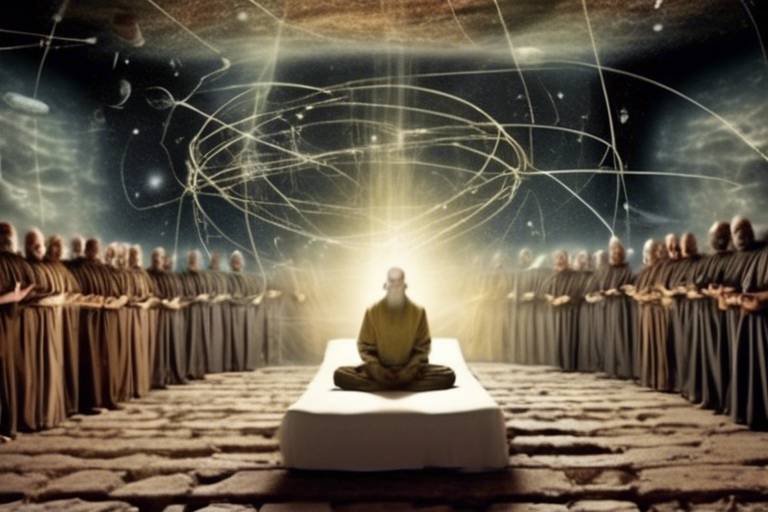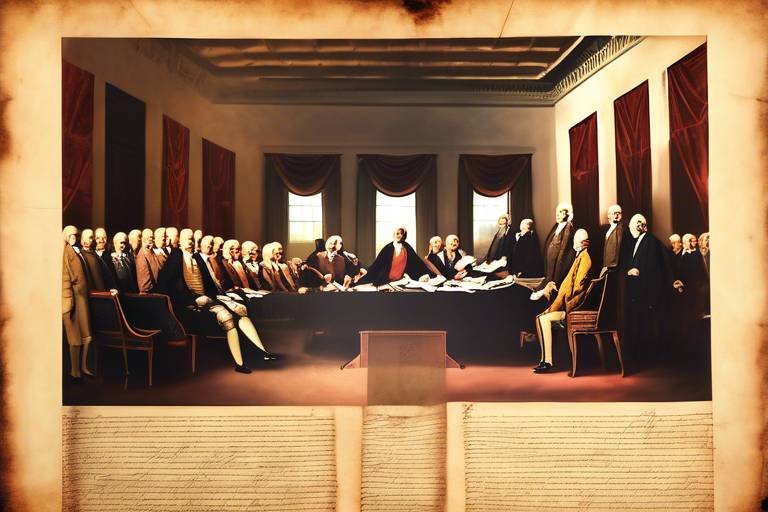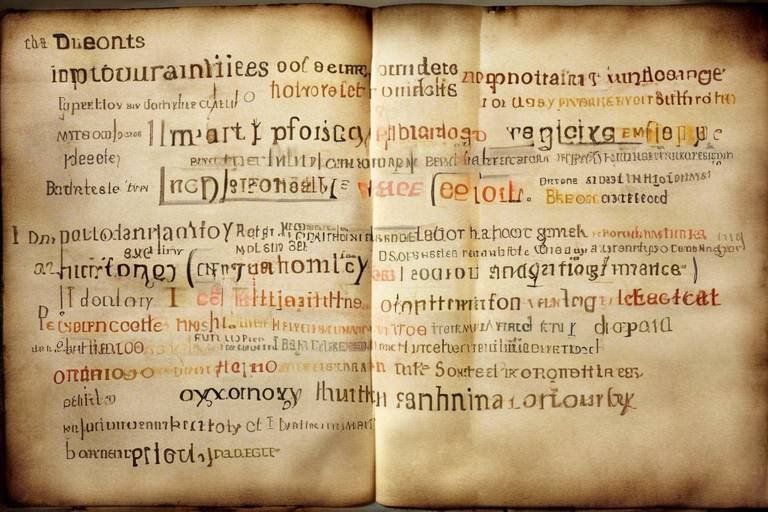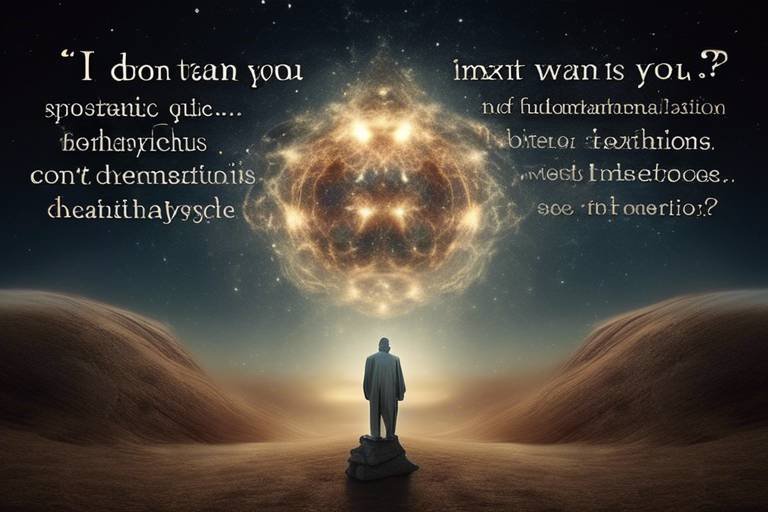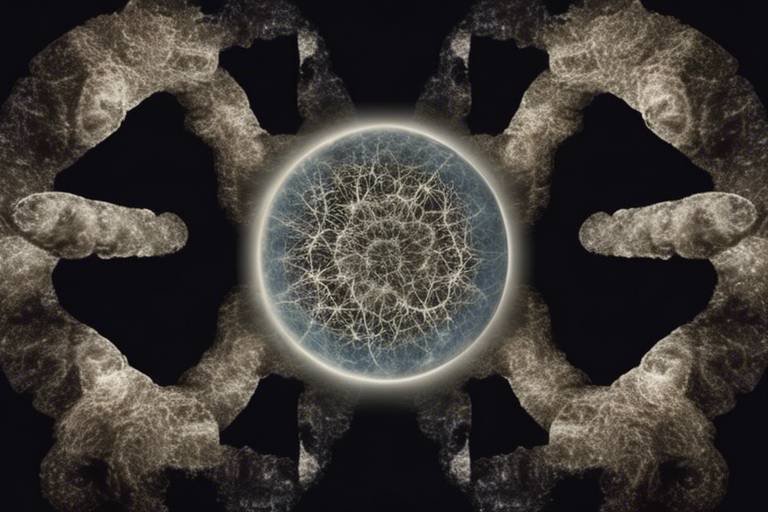Ontology and Its Influence on Religious Thought
Ontology, the philosophical study of being and existence, plays a profound role in shaping religious thought across cultures and epochs. It's like the backbone of our understanding of reality, influencing everything from the nature of God to the essence of human existence. Have you ever pondered why different religions have distinct views on the divine or the afterlife? Well, a significant part of that can be traced back to ontological discussions. These discussions help us explore the fundamental questions of existence: What does it mean to be? What is the nature of reality? And how do these concepts intertwine with our spiritual beliefs?
Throughout history, ontology has acted as a bridge between philosophy and religion, prompting thinkers to wrestle with the nature of existence and its implications for faith. For instance, early philosophers like Plato and Aristotle laid the groundwork for ontological inquiry, each offering unique perspectives that would later influence theological debates. Plato's theory of ideal forms suggested a dualistic separation between the material and spiritual realms, while Aristotle's substance theory emphasized the importance of the physical world. These foundational ideas sparked a myriad of discussions about the divine, creation, and the essence of life itself.
As we move through the ages, the integration of ontology with theology became more pronounced, especially during the Medieval period. Scholars sought to reconcile faith with reason, leading to significant developments in religious philosophy. This interplay between ontology and religious thought is not just a historical curiosity; it continues to resonate today as modern theologians and philosophers grapple with questions about the nature of God and existence. In essence, ontology is not merely an abstract concept; it is a vital part of our spiritual journey, influencing how we understand ourselves and our place in the universe.
In the modern context, ontological debates have become increasingly relevant. With the rise of analytic theology, scholars are employing ontological discussions to clarify and defend religious beliefs, emphasizing the importance of precise definitions and logical coherence. At the same time, postmodern thought challenges traditional ontological assumptions, leading to diverse interpretations of religious beliefs and the nature of existence. This ongoing dialogue illustrates that ontology is not a relic of the past; it is a dynamic field that continues to shape our understanding of faith and existence.
In summary, ontology's influence on religious thought is both profound and pervasive. It invites us to explore the deepest questions of existence, encouraging a richer understanding of our beliefs and practices. As we delve deeper into the realms of ontology, we uncover not only the essence of existence but also the intricate tapestry of human spirituality that connects us all.
- What is ontology? Ontology is a branch of metaphysics that studies the nature of being, existence, and reality.
- How does ontology influence religion? Ontology shapes religious beliefs by providing a framework for understanding the nature of God, existence, and the relationship between the material and spiritual worlds.
- Who are some key philosophers associated with ontology? Key figures include Plato, Aristotle, and various medieval theologians who integrated ontology with religious thought.
- What are some contemporary issues in ontology? Modern discussions often revolve around the nature of God, existence, and the implications for religious belief systems, especially in light of postmodern critiques.

Understanding Ontology
Ontology is not just a fancy term thrown around in philosophical circles; it is a foundational aspect of our understanding of existence itself. To put it simply, ontology is the branch of metaphysics that investigates the nature of being and existence. It asks profound questions like, "What does it mean to exist?" and "What is the essence of reality?" These inquiries are not merely academic; they resonate deeply within our daily lives, influencing how we perceive the world around us and our place within it.
At its core, ontology explores the categories of being and their relationships. Think of it as a lens through which we can examine different entities and their properties. For example, when we consider a chair, ontology prompts us to ask not just what a chair is but what it means for something to be a chair. Is it the material it's made from, its function, or perhaps its form? This kind of inquiry leads us to understand that existence is not a one-size-fits-all concept; instead, it is layered and complex, much like an onion with many skins.
One of the most fascinating aspects of ontology is how it shapes our understanding of reality. Different philosophical traditions propose various ontological frameworks that can significantly influence religious thought. For instance, some argue for a materialistic ontology, where only physical entities are deemed real, while others advocate for a dualistic approach, recognizing both the material and the spiritual. This dichotomy has profound implications for how we view divinity, morality, and the universe itself.
Furthermore, ontology is not static; it evolves as our understanding of the world changes. In ancient times, philosophers like Plato and Aristotle laid the groundwork for ontological thought, but as we moved into the medieval period and beyond, new ideas emerged that integrated ontology with theological considerations. This evolution reflects humanity's ongoing quest to comprehend existence and our place in the cosmos.
In summary, ontology is a crucial field that invites us to ponder the very nature of existence. It challenges us to look beyond the surface and explore the deeper meanings behind what it means to be. Whether through ancient philosophical debates or contemporary discussions, ontology continues to shape our religious beliefs and practices, making it a vital area of study for anyone interested in the intersection of philosophy and spirituality.

Historical Perspectives on Ontology
Throughout history, the concept of ontology has evolved significantly, reflecting the diverse ways cultures and philosophical traditions have grappled with the nature of existence. From the ancient philosophers to contemporary thinkers, ontology has played a pivotal role in shaping religious thought and belief systems. By examining these historical perspectives, we can better understand how ontology has influenced various religious practices and doctrines over time.
In ancient Greece, philosophers like Plato and Aristotle laid the groundwork for ontological discussions. Their explorations into the essence of existence not only influenced philosophical thought but also had profound implications for religious interpretations. For instance, Plato's theory of ideal forms posited that beyond our material world lies a realm of perfect, abstract forms. This dualistic view of reality suggested that the physical world was merely a shadow of a higher spiritual truth, impacting how many interpreted the divine and the nature of existence itself.
Aristotle, on the other hand, approached ontology from a different angle. His substance theory emphasized the importance of the physical world, arguing that the essence of things is found in their tangible existence. This perspective encouraged a more integrated view of the material and spiritual realms, influencing religious thought by suggesting that understanding the physical world could lead to insights about the divine. The contrasting approaches of these two philosophers highlight the rich tapestry of ontological thought and its implications for religion.
As we move into the Medieval period, ontology became further intertwined with theology. Scholars such as Thomas Aquinas sought to reconcile faith with reason, leading to significant developments in religious philosophy. Aquinas's synthesis of Aristotelian thought with Christian theology exemplifies how ontological discussions were used to defend and articulate religious beliefs. His work emphasized the existence of God as the necessary being, which became a cornerstone of Christian ontology.
In addition to Western thought, various cultures have approached ontology in unique ways. For example, in Eastern philosophies, concepts of existence often diverge from the binary thinking prevalent in Western traditions. Understanding these perspectives is crucial to grasping the full impact of ontology on religious thought. The interplay between different ontological frameworks has resulted in a rich dialogue that continues to evolve today.
Ultimately, the historical perspectives on ontology reveal a dynamic interplay between philosophy and religion. As thinkers throughout the ages have grappled with questions of existence, their insights have shaped not only philosophical discourse but also the very foundations of religious belief systems. This ongoing dialogue between ontology and religion invites us to reflect on our own understanding of existence and the divine.
- What is ontology? Ontology is a branch of metaphysics that studies the nature of being and existence.
- How did ancient philosophers influence religious thought? Ancient philosophers like Plato and Aristotle explored concepts of existence that shaped theological debates and interpretations of the divine.
- What role did medieval scholars play in ontological discussions? Medieval scholars integrated ontology with theology, reconciling faith and reason, which led to significant developments in religious philosophy.
- How do Eastern philosophies approach ontology? Eastern philosophies, such as Buddhism and Hinduism, offer unique perspectives on existence that differ from Western ontological frameworks.

Ancient Philosophical Foundations
The foundations of ontology were laid by ancient philosophers who sought to understand the very essence of existence. These thinkers were not just pondering abstract ideas; they were wrestling with profound questions about reality that would shape religious thought for centuries to come. Imagine sitting in a sun-drenched courtyard in ancient Greece, surrounded by the musings of Socrates, Plato, and Aristotle, as they dissect the nature of being and what it means to exist. Their discussions were more than mere philosophy; they were the seeds of future theological debates that would influence countless belief systems.
Plato, for instance, introduced the theory of ideal forms, which proposed a dualistic view of reality. According to Plato, the material world is merely a shadow of a higher, unchanging reality of forms or ideas. This notion profoundly impacted religious interpretations, suggesting that the divine is separate from the physical realm. In Plato’s world, true knowledge comes from understanding these ideal forms, leading many to believe that the divine is a perfect version of our flawed reality. This perspective invites us to ponder: Is the divine something we can truly understand, or is it forever beyond our grasp?
On the other hand, Aristotle offered a contrasting viewpoint with his substance theory. He argued that everything in existence is made of substances, which are the fundamental realities that underlie all things. For Aristotle, understanding the essence of a substance involves looking at its properties and potentialities. This approach emphasizes the importance of the physical world, suggesting that our understanding of existence is rooted in the tangible and observable. Thus, Aristotle’s ideas encourage us to consider how the divine might manifest in the world around us.
Both philosophers laid the groundwork for future ontological discussions, intertwining their ideas with religious thought. Their debates on existence, essence, and the divine opened doors to a multitude of interpretations across various cultures and religions. For instance, the early Christian theologians grappled with these philosophical concepts, trying to reconcile them with their faith. The influence of ancient ontology is evident in how religious beliefs evolved, as thinkers sought to understand not just what exists, but why it exists and what that means for humanity.
As we explore the ancient philosophical foundations of ontology, it becomes clear that these early discussions were not merely academic. They were deeply intertwined with the spiritual and existential questions that continue to resonate today. By examining the interplay between philosophy and religion, we gain insight into how these ancient ideas have shaped our understanding of existence and the divine across centuries.
- What is ontology? Ontology is a branch of metaphysics that studies the nature of being and existence.
- How did ancient philosophers influence religious thought? Ancient philosophers like Plato and Aristotle explored fundamental questions about existence, which laid the groundwork for future theological debates and shaped various religious beliefs.
- What is Plato's theory of ideal forms? Plato's theory suggests that the material world is a shadow of a higher reality of perfect forms, influencing interpretations of the divine.
- What does Aristotle mean by substance? Aristotle defines substance as the essence of things, emphasizing the importance of the physical world in understanding existence.

Plato's Ideal Forms
Plato's theory of Ideal Forms, also known as the theory of Forms or Ideas, is a fascinating concept that has left an indelible mark on philosophical and religious thought. At its core, this theory posits that beyond our tangible, physical world lies a realm of abstract, perfect forms that represent the true essence of all things. Imagine the physical chair you sit on; it is merely a shadow of the "Ideal Chair" that exists in this higher realm. This notion of dualism—where the material and the immaterial coexist—has profoundly influenced how we interpret the divine and the nature of existence.
In Plato's view, these Ideal Forms are immutable and eternal, contrasting sharply with the ever-changing physical world we experience daily. For instance, when we think of beauty, we may appreciate a beautiful sunset or a work of art, but according to Plato, these are simply reflections of the ultimate Form of Beauty. This perspective invites us to ponder: if there are perfect forms for all things, what does that imply about the divine? Could the divine itself be an Ideal Form, transcending our limited understanding?
The implications of Plato's Ideal Forms extend into the realm of religion, particularly in how various faiths perceive the divine. For example, in Christianity, the concept of God can be seen as the ultimate Ideal Form—a perfect embodiment of goodness, truth, and beauty. This raises intriguing questions about the relationship between the material world and the divine: Are our earthly experiences mere reflections of a higher reality? How does this understanding shape our spiritual practices and beliefs?
To illustrate this further, let's consider a table comparing Plato's Ideal Forms with some key religious concepts:
| Concept | Plato's Ideal Forms | Religious Parallel |
|---|---|---|
| Essence | True nature of things, unchanging | God as the ultimate essence |
| Reality | Two realms: physical and ideal | Heavenly realm vs. earthly existence |
| Knowledge | Understanding through reason | Faith and revelation |
In summary, Plato's Ideal Forms offer a compelling framework for understanding the complexities of existence and divinity. By recognizing that our physical world is but a shadow of a higher reality, we open ourselves to deeper philosophical and spiritual inquiries. This dualistic nature of reality invites us to explore the relationship between the material and the spiritual, ultimately enriching our understanding of both our existence and our beliefs.

Aristotle's Substance Theory
Aristotle's Substance Theory is a cornerstone of his metaphysical framework, fundamentally reshaping how we perceive existence and the nature of reality. Unlike Plato, who proposed a dualistic view of the world through his theory of ideal forms, Aristotle focused on the tangible aspects of existence. He argued that substance is what makes an entity what it is—its essence or fundamental nature. This concept is pivotal because it emphasizes that understanding the physical world is essential for grasping the broader implications of existence.
In Aristotle's view, everything in the universe can be categorized into substances, which are individual entities that possess distinct characteristics. For instance, a particular tree is a substance, and its essence includes its physical properties, such as its height, color, and species. However, these properties do not solely define the tree; rather, they contribute to its overall identity. This approach allows for a more comprehensive understanding of the material world, which Aristotle believed was crucial for comprehending the divine.
One of the key elements of Aristotle's Substance Theory is the distinction between primary substances and secondary substances. Primary substances refer to individual entities, like a specific person or a particular animal, while secondary substances are the categories or species to which these individuals belong, such as 'human' or 'dog'. This classification highlights the interconnectedness of all beings and suggests that understanding an individual requires considering both its unique characteristics and its broader category.
Moreover, Aristotle introduced the notion of hylomorphism, which posits that every substance is a composite of matter and form. Matter represents the physical aspect, while form embodies the essence or the defining characteristics of the substance. This duality allows for a richer exploration of existence, as it suggests that to understand a substance fully, one must consider both its material and formal aspects. This theory not only influenced philosophical discourse but also had profound implications for religious thought, particularly in how one perceives the relationship between the material world and the divine.
To illustrate Aristotle's Substance Theory, consider the following table:
| Type of Substance | Description | Examples |
|---|---|---|
| Primary Substance | Individual entities that exist independently. | A specific cat, a particular tree |
| Secondary Substance | Categories or species that primary substances belong to. | Feline, Plant |
Aristotle's emphasis on substance paved the way for future theological discussions, particularly regarding the nature of God and the material world. By asserting that the physical realm is not merely an illusion but a vital component of existence, he encouraged a more integrated approach to understanding divinity. This idea resonates through various religious philosophies, as many seek to reconcile the spiritual with the material, drawing from Aristotle's insights to explore the essence of existence in their own contexts.

Medieval Ontological Developments
The Middle Ages marked a pivotal era for ontology, as scholars sought to intertwine faith and reason in their quest for understanding existence. During this period, prominent thinkers like St. Augustine and St. Thomas Aquinas emerged, each contributing to a rich tapestry of ontological thought that shaped religious philosophy. Their works not only addressed the nature of being but also sought to reconcile the teachings of Christianity with the philosophical insights of ancient Greece and Rome.
St. Augustine, for instance, introduced the idea that the essence of being is inherently tied to God. He argued that true existence comes from the divine, and everything else is merely a reflection of that ultimate reality. This perspective led to a dualistic understanding of existence, where the material world was often seen as inferior to the spiritual realm. He famously stated, "You have made us for yourself, O Lord, and our hearts are restless until they rest in you," highlighting the belief that understanding existence requires a relationship with the divine.
On the other hand, St. Thomas Aquinas took a different approach by integrating Aristotelian philosophy into Christian theology. He posited that substance and essence are crucial in understanding the nature of existence. Aquinas emphasized that God is the necessary being whose existence is self-evident, while everything else is contingent. His famous Five Ways provide arguments for the existence of God, illustrating how ontological reasoning can support religious beliefs. In his view, the material world and the divine are not in opposition but are part of a greater reality that can be understood through reason.
Moreover, the medieval period saw the rise of scholasticism, a method of critical thought that emphasized dialectical reasoning. Scholars engaged in rigorous debates, refining their ontological arguments to address questions about the nature of God, the soul, and the relationship between faith and intellect. This intellectual movement led to the development of a more systematic theology, where ontology played a crucial role in defining the characteristics of God and the nature of existence.
As a result, the ontological developments during the medieval period not only influenced religious thought but also laid the groundwork for future philosophical inquiries. The interplay of faith and reason created a rich dialogue that would echo through the Renaissance and into modern philosophy. By examining these historical perspectives, we can appreciate how ontology has shaped our understanding of existence and its implications for religious belief systems.
- What is ontology?
Ontology is a branch of metaphysics that studies the nature of being, existence, and reality.
- How did medieval thinkers influence religious thought?
Medieval thinkers like St. Augustine and St. Thomas Aquinas integrated philosophy and theology, shaping the understanding of existence and the divine.
- What role does ontology play in modern philosophy?
Ontology continues to be relevant in contemporary discussions about the nature of God, existence, and the implications for various belief systems.

Ontology in Eastern Religions
When we dive into the realm of Eastern religions, we encounter a rich tapestry of ontological perspectives that shape their spiritual practices and beliefs. Unlike the Western philosophical traditions that often emphasize a dualistic separation between the material and spiritual worlds, Eastern philosophies tend to embrace a more holistic view of existence. This holistic approach not only influences how adherents perceive their reality but also profoundly impacts their spiritual journeys. For instance, both Buddhism and Hinduism present unique interpretations of ontology that challenge conventional notions of self, existence, and the ultimate reality.
In Buddhism, the concept of emptiness (śūnyatā) plays a pivotal role in its ontological framework. This idea challenges the very essence of what we consider to be 'real.' According to Buddhist teachings, all things are interdependent and lack inherent existence. This means that the self, as we typically understand it, is an illusion. The implications of this perspective are profound: by recognizing the emptiness of all phenomena, individuals can attain a deeper understanding of reality and ultimately achieve spiritual liberation. This ontological view encourages practitioners to let go of attachments, thereby fostering a sense of freedom and enlightenment.
On the other hand, Hinduism presents a different yet equally compelling ontological perspective through the concept of Brahman. In Hindu philosophy, Brahman is regarded as the ultimate reality, an all-encompassing presence that transcends the material world. This ontological understanding posits that everything in existence is a manifestation of Brahman, leading to a profound sense of interconnectedness among all beings. In this light, the individual self (Atman) is not separate from the divine; rather, it is an expression of the same ultimate reality. This belief fosters a deep sense of unity and purpose among practitioners, as they strive to realize their own divine nature and their connection to the cosmos.
To illustrate the differences and similarities in ontological views between Buddhism and Hinduism, let's take a look at the following table:
| Aspect | Buddhism | Hinduism |
|---|---|---|
| View of Self | Illusion (Anatta) | True Self (Atman) |
| Ultimate Reality | Emptiness (śūnyatā) | Brahman |
| Nature of Existence | Interdependent origination | Unity of all beings |
| Goal of Practice | Achieve Nirvana | Realize oneness with Brahman |
In summary, the ontological perspectives in Eastern religions offer profound insights into the nature of existence and our place within it. While Buddhism emphasizes the illusory nature of the self and the concept of emptiness, Hinduism celebrates the unity of all beings through the lens of Brahman. These differing views not only shape the spiritual practices of their adherents but also contribute to a broader understanding of reality that transcends cultural boundaries. As we continue to explore these rich traditions, we uncover the intricate ways in which ontology influences religious thought, guiding practitioners on their paths to enlightenment and self-realization.
- What is ontology? Ontology is a branch of metaphysics that studies the nature of being, existence, and the categories of being.
- How does ontology influence religious thought? Ontology shapes religious beliefs by providing frameworks for understanding existence, the nature of the divine, and the self.
- What role does emptiness play in Buddhism? Emptiness in Buddhism challenges the notion of a permanent self, promoting the idea that all things are interdependent and lack inherent existence.
- What is Brahman in Hinduism? Brahman is the ultimate reality in Hindu philosophy, representing the interconnectedness of all existence and the divine essence within every being.

Buddhist Ontology of Emptiness
Buddhism introduces a fascinating and profound concept known as emptiness, or śūnyatā, which fundamentally challenges traditional Western notions of existence and self. At its core, this idea posits that nothing possesses an inherent, independent essence. Instead, everything is interdependent, arising in relation to other phenomena. Imagine a vast tapestry where each thread is essential to the overall design; remove one, and the entire piece transforms. This analogy captures the essence of emptiness in Buddhist thought.
In practical terms, the ontology of emptiness leads to a radical rethinking of identity and existence. It suggests that the self is not a fixed entity but rather a collection of transient experiences and perceptions. This perspective is liberating, as it allows individuals to let go of rigid self-concepts and embrace the fluidity of life. By understanding emptiness, practitioners can cultivate a sense of detachment from material possessions and ego-driven desires, leading to a more profound spiritual liberation.
The implications of this ontological view are far-reaching, influencing various aspects of Buddhist practice, including meditation and ethical behavior. For instance, recognizing the emptiness of the self encourages compassion towards others, as it highlights our interconnectedness. When one realizes that their suffering is intertwined with the suffering of others, it fosters a sense of empathy and responsibility. This interconnectedness is beautifully summarized in the following key principles:
- Interdependence: All beings and phenomena are interconnected, meaning that our actions have far-reaching consequences.
- Impermanence: Everything is in a constant state of flux, which underscores the transient nature of existence.
- Non-Self: The idea that there is no permanent, unchanging self, which liberates individuals from the confines of ego.
Moreover, the ontology of emptiness serves as a foundation for the practice of mindfulness. By recognizing the emptiness of thoughts and emotions, individuals can observe them without attachment, leading to greater mental clarity and peace. This practice aligns closely with the core teachings of the Buddha, who emphasized the importance of understanding the nature of reality to alleviate suffering.
In summary, the Buddhist ontology of emptiness not only reshapes our understanding of existence but also provides a transformative framework for personal growth and spiritual awakening. By embracing this profound teaching, individuals can cultivate a deeper sense of peace, compassion, and interconnectedness in their lives.
- What is the significance of emptiness in Buddhism? Emptiness is crucial in Buddhism as it challenges the notion of a fixed self and encourages a deeper understanding of interdependence, leading to spiritual liberation.
- How does the concept of emptiness affect meditation practice? Understanding emptiness allows practitioners to observe thoughts and emotions without attachment, enhancing mindfulness and mental clarity.
- Can the idea of emptiness be applied in daily life? Yes, recognizing the interconnectedness of all beings can foster empathy and compassion, influencing how we interact with others.

Hindu Ontology and Brahman
In Hindu philosophy, the concept of Brahman stands as the cornerstone of ontology, representing the ultimate reality that transcends all forms of existence. Brahman is not merely a deity or a god; rather, it embodies the essence of everything that is, was, and will be. This profound understanding invites us to ponder: what does it truly mean to exist? In the vast tapestry of Hindu thought, Brahman is often described as infinite, eternal, and universal, serving as the source from which all beings emerge and to which they ultimately return.
Hindu ontology presents a dualistic view between Brahman and Atman, the individual self. The relationship between these two concepts is pivotal, as it posits that the Atman, or individual soul, is not separate from Brahman, but rather a manifestation of it. This leads to the understanding that realizing one's true self (Atman) is synonymous with realizing Brahman. The journey of self-discovery in Hinduism is deeply intertwined with the quest for understanding this ultimate reality. In essence, the realization of the unity between Atman and Brahman is considered the highest goal of human existence.
Furthermore, the teachings found in ancient texts such as the Upanishads explore the nature of Brahman through various lenses, providing rich metaphors and analogies to help individuals grasp its significance. For example, Brahman is often likened to the ocean, with individual souls being like waves. While the waves may appear distinct and separate, they are ultimately part of the same vast ocean. This analogy not only highlights the interconnectedness of all beings but also emphasizes the illusion of separateness that often clouds human perception.
To further understand this intricate relationship, consider the following key characteristics of Brahman:
- Sat: The aspect of being or existence.
- Chit: The aspect of consciousness or awareness.
- Ananda: The aspect of bliss or ultimate joy.
These attributes serve as guiding principles for practitioners, encouraging them to seek a deeper understanding of their own existence and the nature of reality. The path to realizing Brahman is often explored through practices such as meditation, yoga, and self-inquiry, each designed to peel away the layers of ignorance that obscure the true nature of the self.
In contemporary discourse, the ontological perspective of Brahman continues to inspire philosophical debates and discussions. Scholars and spiritual seekers alike explore how this ancient understanding can be reconciled with modern scientific insights into the nature of reality. The dialogue between Hindu ontology and contemporary thought invites a rich exploration of existence that transcends cultural and temporal boundaries, reminding us that the quest for understanding is a universal endeavor.
- What is Brahman in Hinduism? Brahman is the ultimate reality in Hindu philosophy, representing the source and essence of all existence.
- How does Brahman relate to Atman? Atman is the individual soul, which is considered a manifestation of Brahman, highlighting the interconnectedness of all beings.
- What practices can help one realize Brahman? Practices such as meditation, yoga, and self-inquiry are commonly employed to foster a deeper understanding of Brahman.
- How does Hindu ontology influence modern thought? The ontological perspective of Brahman continues to inspire philosophical debates and discussions, bridging ancient wisdom with contemporary insights.

Contemporary Ontological Debates
In today's rapidly evolving philosophical landscape, ontological debates are more relevant than ever. Scholars and theologians grapple with profound questions about the nature of existence, the essence of God, and how these concepts influence religious belief systems. It's fascinating to witness how ancient ideas continue to resonate in modern discussions, shaping our understanding of reality and spirituality.
One of the central issues in contemporary ontology revolves around the nature of God. Think about it: if God exists, what does that mean for the essence of existence itself? This question has sparked a myriad of discussions, particularly in the realm of analytic theology. Here, philosophers employ ontological discussions to clarify and defend religious beliefs. They emphasize the importance of precise definitions and logical coherence, arguing that a well-defined understanding of God can bolster faith and provide a robust framework for theological inquiry.
Moreover, the rise of postmodern thought has introduced a new layer of complexity to ontological debates. Postmodernism challenges traditional assumptions about existence and meaning, leading to diverse interpretations of religious beliefs. For example, it questions the idea of a singular, objective truth, suggesting instead that reality is constructed through language and culture. This perspective has prompted theologians to rethink how they approach religious texts and doctrines, opening up dialogues that were previously unexplored.
To illustrate the current ontological landscape, consider the following table that outlines some key themes in contemporary ontological debates:
| Theme | Description |
|---|---|
| Nature of God | Exploration of God's existence and essence, including discussions on divine attributes. |
| Existence and Reality | Debates on the nature of existence, including subjective vs. objective reality. |
| Analytic Theology | Focus on logical coherence and precise definitions in religious beliefs. |
| Postmodern Challenges | Questioning of traditional ontological assumptions and the construction of meaning. |
As we delve deeper into these discussions, it's essential to recognize that ontology is not just an abstract philosophical exercise; it has real implications for how we live our lives and understand our place in the universe. The interplay between existence and belief shapes our spiritual practices, ethical frameworks, and even our relationships with others. So, the next time you ponder the meaning of life, remember that the roots of your thoughts might just be intertwined with the rich tapestry of ontological inquiry.
In summary, contemporary ontological debates are vibrant and multifaceted, reflecting a dynamic interplay between ancient philosophies and modern thought. Whether through the lens of analytic theology or postmodern skepticism, the quest to understand existence continues to inspire and challenge us, inviting us to explore the profound mysteries of life and faith.
- What is ontology? Ontology is a branch of metaphysics that studies the nature of being, existence, and reality.
- How does ontology influence religious thought? Ontology shapes our understanding of concepts such as God, existence, and the nature of reality, which are central to many religious beliefs.
- What are some contemporary issues in ontology? Current debates include the nature of God, the implications of postmodernism, and the role of analytic theology in clarifying religious beliefs.

Analytic Theology and Ontology
Analytic theology represents a fascinating intersection between traditional theological discourse and contemporary philosophical inquiry, particularly in the realm of ontology. This approach emphasizes clarity, precision, and logical coherence in religious discussions, which is vital for addressing complex questions about the nature of existence and the divine. At its core, analytic theology seeks to unpack theological concepts using the tools of analytic philosophy, which includes rigorous argumentation and a focus on linguistic clarity.
One of the primary goals of analytic theology is to provide a robust framework for understanding God’s nature, existence, and the relationship between the divine and the world. By employing ontological discussions, theologians can clarify what it means to say that God exists and what attributes are essential to the divine nature. For instance, when discussing God's omnipotence, a theologian might engage in ontological analysis to explore whether this attribute is consistent with the existence of evil, thereby addressing a long-standing philosophical problem known as the problem of evil.
This method also allows for a more nuanced understanding of key theological concepts. For example, consider the ontological status of religious beliefs. Are they merely subjective interpretations, or do they reflect an objective reality? Analytic theology encourages scholars to approach such questions systematically. By creating a dialogue between faith and reason, analytic theologians aim to defend the rationality of religious beliefs while also engaging with contemporary philosophical challenges.
The significance of ontology in analytic theology can be illustrated through the following key themes:
- Clarification of Concepts: Analytic theology focuses on defining terms and concepts clearly to avoid ambiguities that can lead to misunderstandings.
- Logical Coherence: It emphasizes the need for logical consistency in theological claims, ensuring that beliefs align with one another and with philosophical reasoning.
- Engagement with Contemporary Issues: Analytic theology addresses modern philosophical debates, making it relevant to current discussions in both philosophy and theology.
In summary, analytic theology’s engagement with ontology enriches theological discourse by providing a structured approach to understanding complex questions about existence and the divine. This method not only aims to clarify and defend religious beliefs but also fosters a deeper appreciation for the intricate relationship between faith and reason. As the dialogue between analytic philosophy and theology continues to evolve, it opens up new avenues for exploring the profound mysteries of existence and the nature of the divine.
- What is analytic theology? Analytic theology is an approach that applies the methods of analytic philosophy to theological concepts, aiming for clarity and logical coherence.
- How does ontology relate to theology? Ontology investigates the nature of being and existence, which is fundamental for discussing the nature of God and religious beliefs.
- Why is clarity important in theology? Clarity helps avoid misunderstandings and ensures that theological discussions are grounded in precise definitions and logical reasoning.

Postmodern Challenges to Ontology
In the ever-evolving landscape of philosophy, the rise of postmodern thought has stirred the pot of traditional ontology, challenging long-held beliefs about the nature of existence and the essence of being. Unlike their predecessors, who sought definitive answers to the questions of reality, postmodern thinkers embrace ambiguity and skepticism, suggesting that our understanding of existence is not as concrete as we once believed. This shift has profound implications for religious thought, as it invites a re-examination of the very foundations upon which many belief systems are built.
One of the central tenets of postmodern philosophy is the idea that truth is subjective. This perspective posits that rather than there being a single, universal truth, each individual’s experience and interpretation shape their reality. For religious adherents, this raises critical questions: If truth is subjective, what does that mean for the absolute truths often claimed by various faiths? Can multiple interpretations of the divine coexist, or does this relativism dilute the essence of religious belief?
Moreover, postmodernism critiques the notion of a stable, fixed identity. In a world where identities are fluid and constantly evolving, how do religious narratives adapt? For instance, traditional teachings may struggle to resonate with individuals who identify with multiple cultures or who experience a shift in their personal beliefs. This fragmentation challenges religious institutions to rethink their approaches to community and doctrine, leading to a more inclusive understanding of spirituality.
As we navigate these postmodern challenges, we see a movement towards pluralism in religious thought. Many contemporary theologians argue for a dialogue between differing belief systems, suggesting that rather than competing for supremacy, religions can learn from one another. This approach not only fosters greater understanding among diverse faiths but also encourages a more profound exploration of the human experience. A table summarizing key differences between traditional and postmodern ontological perspectives can provide further clarity:
| Aspect | Traditional Ontology | Postmodern Ontology |
|---|---|---|
| Nature of Truth | Objective and Universal | Subjective and Relative |
| Identity | Fixed and Stable | Fluid and Evolving |
| Religious Interpretation | Singular and Absolute | Pluralistic and Dialogical |
In light of these challenges, it’s essential for religious scholars and practitioners to engage with postmodern critiques. This engagement can lead to a richer, more nuanced understanding of spirituality that resonates with the complexities of modern life. By embracing the uncertainty and multiplicity of meanings that postmodernism introduces, religious thought can evolve, becoming more relevant and accessible to a diverse audience.
Ultimately, the postmodern challenge to ontology is not merely a threat but also an opportunity. It invites us to reconsider our assumptions about existence and to explore the myriad ways in which people find meaning in their lives. As we delve deeper into these philosophical waters, we may discover that the questions we ask—and the conversations we have—are just as important as the answers we seek.
- What is ontology? Ontology is a branch of metaphysics that studies the nature of being, existence, and reality.
- How does postmodernism challenge traditional ontology? Postmodernism questions the idea of objective truth and fixed identity, advocating for subjective interpretations and pluralism.
- What implications does this have for religious beliefs? It encourages a dialogue between different faiths and allows for a more inclusive understanding of spirituality.
- Can multiple interpretations of the divine coexist? Yes, postmodern thought suggests that diverse interpretations can enrich religious understanding rather than diminish it.
Frequently Asked Questions
- What is ontology?
Ontology is a branch of metaphysics that studies the nature of being, existence, and the reality of things. It seeks to answer fundamental questions about what entities exist and how they can be categorized and related within various contexts.
- How does ontology influence religious thought?
Ontology significantly impacts religious thought by shaping how believers perceive the nature of existence, the divine, and the relationship between the material and spiritual realms. Different ontological perspectives can lead to diverse interpretations of religious texts and beliefs.
- What are the main differences between Plato's and Aristotle's views on ontology?
Plato's ontology focuses on the theory of ideal forms, suggesting a dualistic reality where the material world is a shadow of the true, unchanging forms. In contrast, Aristotle emphasizes substance and the physical world, arguing that understanding existence requires examining the tangible aspects of reality.
- How did medieval scholars integrate ontology with theology?
During the Middle Ages, scholars like Thomas Aquinas sought to reconcile faith with reason, leading to a synthesis of ontological concepts with theological beliefs. This integration allowed for a deeper exploration of God's nature and existence, influencing religious philosophy significantly.
- What is the Buddhist view of ontology?
Buddhism presents a unique ontological perspective, particularly through the concept of emptiness, which challenges the notion of a permanent self and encourages a view of reality that emphasizes impermanence and interdependence, reshaping spiritual practices and liberation.
- What does Brahman represent in Hindu ontology?
In Hinduism, Brahman is regarded as the ultimate reality, the source of all existence. This ontological understanding emphasizes the interconnectedness of all beings and the idea that individual souls (Atman) are ultimately one with Brahman.
- How are contemporary ontological debates relevant to religion?
Modern ontological debates address critical issues like the nature of God, existence, and the implications for belief systems. These discussions help clarify and defend religious beliefs, contributing to a deeper understanding of faith in a contemporary context.
- What is analytic theology?
Analytic theology is an approach that uses ontological discussions to provide clarity and logical coherence to religious beliefs. It emphasizes precise definitions and rigorous argumentation to explore theological concepts and their implications.
- How does postmodern thought challenge traditional ontology?
Postmodern thought questions established ontological assumptions, leading to diverse interpretations of religious beliefs and existence. This has prompted new dialogues in theology and philosophy, encouraging a more pluralistic understanding of reality.


